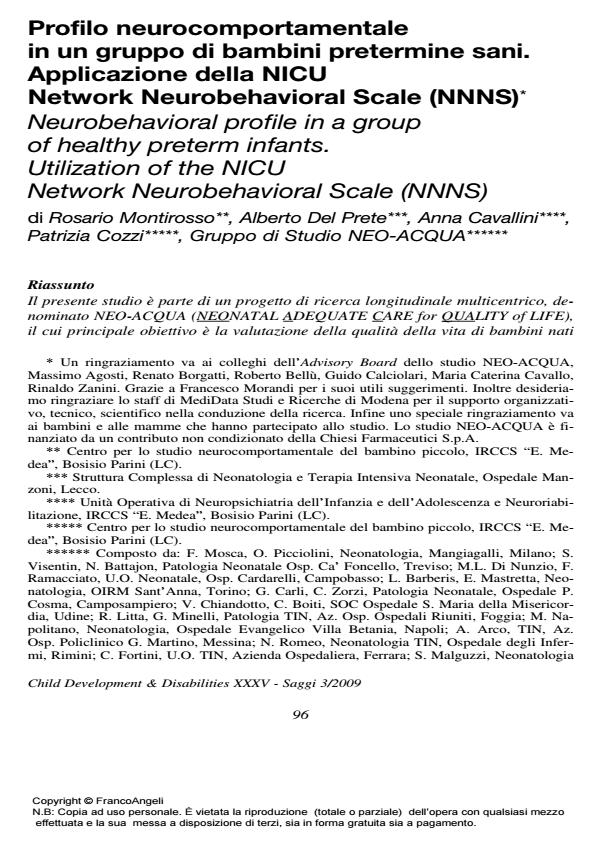Neurobehavioral profile in a group of healthy preterm infants. Utilization of the NICU Network Neurobehavioral Scale (NNNS)
Journal title CHILD DEVELOPMENT & DISABILITIES - SAGGI
Author/s
Publishing Year 2010 Issue 2009/3
Language Italian Pages 21 P. 96-116 File size 328 KB
DOI 10.3280/CDD2009-003005
DOI is like a bar code for intellectual property: to have more infomation
click here
Below, you can see the article first page
If you want to buy this article in PDF format, you can do it, following the instructions to buy download credits

FrancoAngeli is member of Publishers International Linking Association, Inc (PILA), a not-for-profit association which run the CrossRef service enabling links to and from online scholarly content.
This work is part of the NEO-ACQUA (NEONATAL ADEQUATE CARE for QUALITY of LIFE) multi-center, longitudinal study, whose main aim is to assess the quality of life of very preterm infant who are considered "healthy" and in absence of medical complications at discharge. This paper details the outcomes of the neurobehavioral assessment. The major purpose was to investigate possible differences about the neurological and behavioral profile between term and preterm infants. 69 very preterm infants (gestational age < 30th week and/or birth weight < 1500 gr) and 33 term infants took part in this study. Preterm infants were assessed at term equivalent age (_ 37 weeks), while term infants between the second and the third day of life. The neurobehavioral assessment was carried out with Neonatal Intensive Care Unit Network Neurobehavioral Scale (NNNS). Compared to term infants, preterm showed a greater number of non-optimal reflexes and a poorer quality of movements. In the behavioral domain preterm infants showed lower attentional skills and lower ability in the exchanges with the environment. Furthermore, they exhibited a lesser ability in the distress regulation. Finally, they showed higher level of stress. The findings highlight that very preterm infants have an alteration of neurobehavioral profile, even in absence of documented medical complications. This evidence is discussed in the light of the possible use of the NNNS in early intervention programs to preterm infants and to support their caregivers.
Keywords: Neurobehavioral examination, preterm infant, high-risk infant, parent-infant relationship
, Profilo neurocomportamentale in un gruppo di bambini pretermine sani. Applicazione della NICU Network Neurobehavioral Scale (NNNS) in "CHILD DEVELOPMENT & DISABILITIES - SAGGI" 3/2009, pp 96-116, DOI: 10.3280/CDD2009-003005